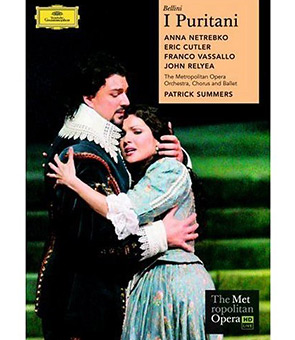
I Puritani
2007. Director: Gary Halvorson. Composer: Vincenzo Bellini. Librettist: Carlo Pepoli. Conductor: Patrick Summers
With Anna Netrebko, Maria Zifchak, Eric Cutler, Franco Vassallo, John Relyea
Deutsche Grammophon Video
Available Dec. 18; list price $39.99
Fifty years ago, when Ed Sullivan would present them in between, say, Sam Levenson and Senor Wences, opera singers had some purchase on general celebrity. People who never went to the Metropolitan Opera, or listened to its Saturday afternoon broadcasts, knew Sutherland, Nilsson, Tebaldi, Merrill, Tucker and la divina, Maria Callas. The high arts have gone into hiding since then, but if any opera star is known now — indeed, if any performer had been tailored to break into popular as well as niche acclaim — it is Netrebko. Lionized on 60 Minutes, appearing in ultra-glam Euro-chic videos of her most famous arias, sporting Dolce & Gabbana frocks, peddling Rolex watches, the Russian soprano was been called "opera Material Girl" by the Times of London.
But, man, can Netrebko sing! And, Lord, can she act! She, no less than her fans, knows that opera is not radio; the time has passed when a soprano could weigh more than James Gandolfini and still persuade an audience she was a Rhine maiden or consumptive waif. Netrebko looks and sounds the part, and has the acting ferocity to sing, to sell, to inhabit the most sensuous roles. Her Violetta in Willy Decker's stripped-down production of La Traviata at Salzburg in 2005, with her frequent singing partner Rolando Villazon as the faithful Alfredo, is already legend. From flirtatious to startlingly passionate (wait for That Kiss), then a figure of pity and finally of tragedy, Netrebko had this non-operaphile gasping with the beautifully judged intensity of her performance. It's the first opera DVD all you scoffers out there should buy.
I Puritani, which the Met put on this spring, isn't quite in the Traviata stratosphere. Set in England during the Civil War of the 1600s, it involved passion among the Puritans — who wear dresses more suited to Versailles. As Beverly Sills, who for the Netrebko production was an entr'acte commentator (one of the last public appearances before her death in July), said, "This whole opera is kinda nutty. ... I enjoyed [singing the role of] Elvira, even though I didn't know what the hell was going on."
What's going on in the plot matters a lot less than what's coming out of Netrebko's mouth. She pours it all into Elvira, who's in love with one man but betrothed to another. Before the (unusual for opera) happy ending, Elvira lurches from love scenes to mad scenes. Sometimes it's not easy to tell which is which — as when Netrebko rushes to the apron of the stage, glances down at the orchestra members, lies flat on her back and sings, "Vien, diletto, e in ciel la luna!" (Come, beloved, the moon is shining!). The moon, that celestial body for lovers and lunatics, shines through Netrebko's soul. She's lovely, scary, luminous. She's not Callas, but she could have Callas' impact: asserting to a mass audience that opera is a vital popular art, an expression of amour and despair at its highest pitch.
In December Netrebko and Villazon were to play the original pair of star-crossed lovers in nine performances of Romeo et Juliette. But her co-star needed rest to protect his voice, so the Met filled Netrebko's song card with three or more different tenors. Another daredevil maneuver, another triumph, which was shown live in movie theaters mid-month. If you missed it, you can count on the DVD being issued in 2008. So, come on! Become a Netrebko collector. It could be even more rewarding than watching every variation of Blade Runner.